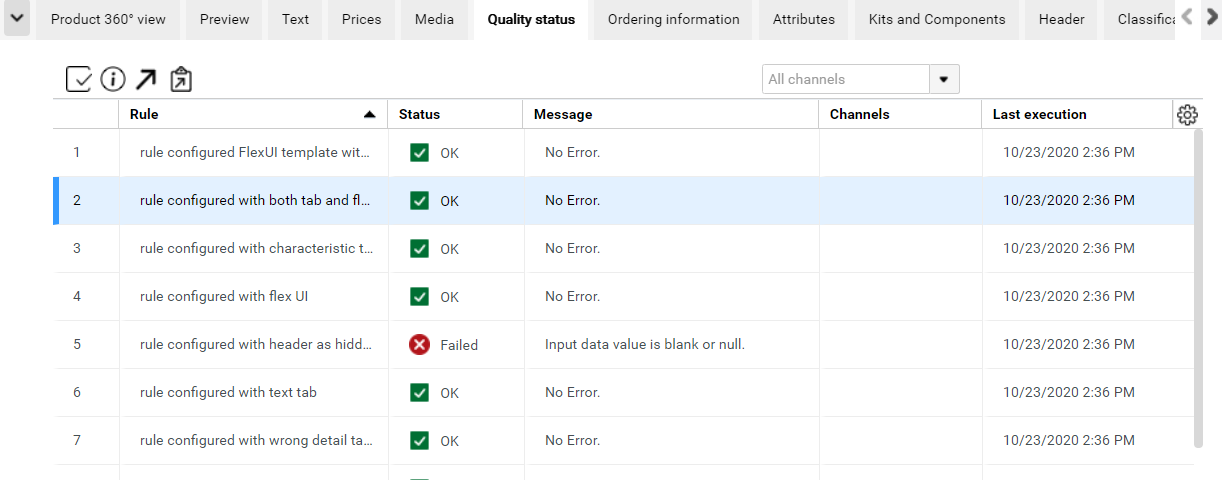Quality status rule navigation and configuration
Quality status rule navigation
Users can navigate to the configured detail tab and flex UI template related to a rule from the Quality status tab.
Buttons for navigation are:
Navigate to the tab

On clicking this button the user gets navigated to the configured detail tab.Navigate to Flex UI

On clicking this button the configured flex UI template is opened in the new browser tab.

Navigation button state
Navigate to the Detail tab
Disabled
When a rule is not selected.
When multiple rules are selected.
When a selected rule has no configuration for tab id.
When a tab id is not configured correctly.
When the tab is not visible.
Enabled
When a single rule is selected and it is configured with the correct tab id or flex UI template name.
Navigate to Flex UI
Disabled
When a rule is not selected.
When multiple rules are selected.
When a selected rule has no configuration for flex UI template name.
When a flex UI template name is not configured correctly.
When a user does not have permission to see the flex UI template.
Enabled
When a single rule is selected and it is configured with the correct tab id or flex UI template name.
Quality status rule navigation configuration
RuleNavigation Attributes
The 'id' is mandatory in "tabDefinitions", "definitions" in "formDefinitions".
|
Name |
M(andatory) |
Example values |
Description |
ruleName |
M |
e.g. "Short Description not empty" |
Name of the rule (Case sensitive) |
rootEntity |
M |
e.g. "Article" |
The root entity associated with the tab |
tabId |
O |
e.g. "web.article.detail.tabs.head" |
Id of the detail tab |
flexTemplateName |
O |
e.g. "Item approve UI" |
Flex UI template name. |
It is mandatory to either pass tabId or flexTemplateName.
Example Definition (DQNavigationDefinition.xml)
<?xml version="1.0" encoding="UTF-8" standalone="yes"?><RuleNavigations xmlns:xsi="http://www.w3.org/2001/XMLSchema-instance" xsi:noNamespaceSchemaLocation="DQNavigationDefinition.xsd"> <ruleNavigation ruleName="Short Description not empty" rootEntity="Article" tabId="web.article.detail.tabs.head" flexTemplateName="Item approve UI"/></RuleNavigations>Combine multiple Data Quality rules configuration
The wildcard syntax ".*" can be used to configure multiple rules with similar names.
Example: If the user wants to combine the below rules
Check long desc not empty
Check long desc min length
Check long desc max length
It can be configured as follows:
<ruleNavigation ruleName="Check long desc.*" rootEntity="Article" tabId="web.article.detail.tabs.head" flexTemplateName="Item approve UI"/>Note:
If ".*" is used in the configured rule name make sure it does not contain any special character like "(,),[,],<,>,$,&,^,%...etc".
If ".*" is used to combine multiple rules then make sure fields used in those rules must belong to the same detail tab and flex UI template.
Configure the characteristic rules configuration
Example Definition (DQNavigationDefinition.xml)
<?xml version="1.0" encoding="UTF-8" standalone="yes"?><RuleNavigations xmlns:xsi="http://www.w3.org/2001/XMLSchema-instance" xsi:noNamespaceSchemaLocation="DQNavigationDefinition.xsd"> <ruleNavigation ruleName="CHARACT_CFG_Article_.*" rootEntity="Article" tabId="articleCharacteristicDetailTab" flexTemplateName=""/> <ruleNavigation ruleName="CHARACT_CFG_Product_.*" rootEntity="Product2G" tabId="productCharacteristicDetailTab" flexTemplateName=""/> <ruleNavigation ruleName="CHARACT_CFG_Variant_.*" rootEntity="Variant" tabId="variantCharacteristicDetailTab" flexTemplateName=""/></RuleNavigations>Where to get "tabId" and "flexTemplateName"
"tabId"
We can set the "tabId" based on the "id" field of each tab provided in the various types of "Detail Tab Definitions XML's".
"flexTemplateName"
We can set the "flexTemplateName" based on the "name" of the flex UI template.